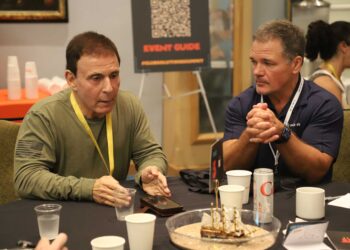“Politics is hard. Get involved anyway.”
That was essentially the theme of this week’s Thought Leaders panel on the importance of political advocacy. During the discussion, panelists Chris Craytor of ACAC, Greta Wager of Chelsea Piers, Kevin McHugh of The Atlantic Club and Merikay Marzoni of Fitness Formula Clubs shared that politics can be confusing and difficult, but that getting involved is “just good business.”
“Political advocacy on the local and state level is just good business,” said Marzoni. “There is no wrong time to start. I think when the pandemic hit, we realized it’s difficult to go back in time and scramble to get relationships when you really need them. I think we learned to really invite local officials to club events, to tour our clubs, let them workout at our clubs. You never know when you’re going to need them.”
The COVID-19 pandemic revealed the true need for relationships with local, state and national government officials. However, despite knowing the need, some club owners and operators have been hesitant to act. McHugh said operators may be hesitant to reach out because they fear elected officials are difficult to contact. But he has found the opposite to be true.
“We think sometimes a congressman or senator is more unapproachable than they are,” said McHugh. “They’re not unapproachable. If you call up a chief of staff in a congressional office, they’re going to get back to you. They don’t care what size business you have; they’ll get back to you. Once we were able to get one or two politicians in the state on board, you can say we have three people cosigned, then getting the fourth and fifth, and so on, to join is easier.”
While contacting politicians is easy to do, especially since their emails are public information, the panel discussed more reasons owners and operators are still hesitant to get involved.
Politics has been the center of every news station for the past three years since 2020 was a presidential election year. Many people are burnt out on the conversation or simply don’t want to get wrapped into it. However, McHugh pointed out that the GYMS Act isn’t political, but rather essential for the future of the industry.
“If we have a club owner who is not interested in the GYMS Act and what that means for the industry and other gyms, that’s bad business,” explained McHugh. “The legislation is something that can help their business, our business and is something that is universal. It’s not democratic or republican. The GMYS Act saves the fitness industry. It’s not political.”
While the GYMS Act is important to the future of the industry, Wagner said it shouldn’t be the only reason to start making relationships with your elected officials.
“The GYMS Act is very important, but there’s going to be other legislation coming down the pipeline,” said Wagner. “You need to know your local government officials. You need to build those relationships now, for the future. People don’t want to hear from you in a crisis. [During a crisis] you can’t explain to them who you are, what your mission is, or that you can add to the equation and help solve [the problem]. Do it now and talk to as many people as you can so they know your business.”
It’s no secret that political advocacy is challenging and a lot of work. The panel emphasized that not all gym operators have to lead the way, but they all should join the fight. As Craytor said, be willing to join, participate and help. Participating in state alliances and saying consistent over time is also important.
“Now we’re in a situation where clubs are beginning the slow-climb back to normal in most of the country, [and] our focus can move to other things,” said Craytor. “The degree to which you can support the state alliances and make them active not just when there’s a crisis, but also maintaining a sense of advocacy and effort even if COVID-19 is in the rearview mirror or waning, I think that’s really important. We’ve learned before that if we take our foot off the gas pedal and aren’t involved, we’re going to be right back in the same boat where we started 18 months ago.”
You can watch the full conversation, here.
For more resources on state alliances, the GYMS Act and political advocacy, visit the links below.
- https://www.ihrsa.org/industry-leadership/state-alliances/
- http://thegymsact.com/
- https://www.quorum.us/dashboard/external/EUqiNkSAiIlpKmXAMteX/
- https://ihrsa.quorum.us/sponsormap/
Stay ahead in the fitness industry with exclusive updates!
Taylor Gabhart is the editor of Club Solutions Magazine. She can be reached at taylor@peakemedia.com.











